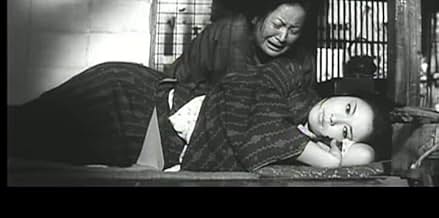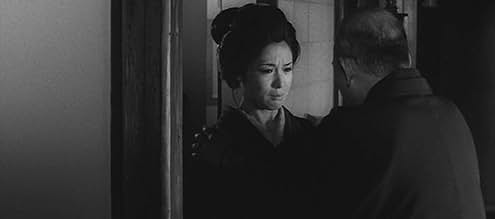Adicionar um enredo no seu idiomaOn the eve of the Russo-Japanese war at the beginning of the 20th century, small-town girl Okane has married an old wealthy man to escape a life of poverty.On the eve of the Russo-Japanese war at the beginning of the 20th century, small-town girl Okane has married an old wealthy man to escape a life of poverty.On the eve of the Russo-Japanese war at the beginning of the 20th century, small-town girl Okane has married an old wealthy man to escape a life of poverty.
- Direção
- Roteiristas
- Artistas
- Prêmios
- 3 vitórias no total
- Direção
- Roteiristas
- Elenco e equipe completos
- Produção, bilheteria e muito mais no IMDbPro
Avaliações em destaque
An absolutely Masterpiece from a great underrated director, who worked as assistant of Mizoguchi and his films, like those of his master's, are contemplative, although not such slow. Seisaku's Wife tells a rich and impressive story about an inevitable love in contradiction to military honor. You can see desperate life instinct in the age of imperial deadly values. This dichotomy, of course, is not unfamiliar in Japanese classic cinema: Naruse's Floating Clouds and, even more, Suzuki's Story of a Prostitute (also made in 1965) showed the same contradiction. But I found Masumura's movie stronger: Majestic pictures, simple but splendid music, and excellent performances.
It is strongly recommended, especially if you love infinite golden heritage of Japanese studio cinema.
An astonishing film in terms of it's relentless power to both shock and move. It has a quick and melodic pace, something rather uncommon for films of the time. It gets moving straight away and sets us in a world of misplaced honor and preconceptions. Wakao is simply stunning in both her looks and talent. She plays a beaten down woman with a lot of spite, but equal amounts of heart. After the death of her sugar daddy, she returns to her home village where she is seen as tainted goods. It isn't long before a role model soldier returns to the village and, against the wishes of the townsfolk, sets his sites on the outcast. The two both seem to be rebelling against society, but also do have genuine affection for each other. It isn't something that is easy to pull off. By the time the violent third comes around it is a disturbing act of love that perfectly sums up the complex themes running around. This film is unforgettable and I would even recommend it to those that find early Asian cinema a bit slow. Hopefully, this could open some doors.
I watched Yasuzo Masumura's Red Angel a few nights ago, and was really impressed, so decided to watch another film of his that also starred Ayako Wakao in the lead role. Both it and Seisaku's Wife are perhaps comparable in the sense that they focus on love during wartime, and much like life, show it to be no party, no disco, nor any kind of fooling around. But Red Angel's grimness was unrelenting and genuinely shocking, and Seisaku's Wife feels a little more melodramatic in a way I couldn't quite click with. It's very repetitive, and even though I do agree with what I think the movie is criticizing, I just got so worn down by how much it seems to repeat itself.
It might be the point - the endless (and annoying) gossiping and two lead characters who keep feeling stuck by the terrible and backward small town they live in. I don't know if it fully came together, though, and the more shocking scenes feel jarring in a way that might've also been intentional, but still didn't hit me the way I think they were supposed to. It's a bit of a mess, but I think it's well-shot and mostly well-acted, and also given that some of the frustrations I felt are probably the point (doesn't mean I liked feeling that way, nor found it the "right" amount of frustrating), I can't exactly call it bad. I'll absolutely never watch it again, though.
It might be the point - the endless (and annoying) gossiping and two lead characters who keep feeling stuck by the terrible and backward small town they live in. I don't know if it fully came together, though, and the more shocking scenes feel jarring in a way that might've also been intentional, but still didn't hit me the way I think they were supposed to. It's a bit of a mess, but I think it's well-shot and mostly well-acted, and also given that some of the frustrations I felt are probably the point (doesn't mean I liked feeling that way, nor found it the "right" amount of frustrating), I can't exactly call it bad. I'll absolutely never watch it again, though.
A wild and fascinating melodrama full of passion, love, war, and hate.
Japan at the beginning of the 20th century. Okane, a beautiful girl from a poor family, must serve as a mistress to a much older rich man. When he and her father die, the young woman returns with her mother to their native village. The locals despise them because of Okane's past, the young woman meets them with arrogance and haughty behavior. But then everything changes when her mother dies and the handsome Seisaku, a young man who is regarded as a model soldier and the son-in-law of their dreams by the villagers, helps her in this difficult situation. The two fall in love and marry against the spite of the whole village (their passionate sexual relationship is emphasized during the whole film), but then Seisaku has to go to war against the Russians and their world falls apart...
Violent and passionate, wonderfully photographed and played (especially by the beautiful Ayako Wakao), full of hot tears but nevertheless never sentimentalist or kitschy, this Japanese film is a real discovery.
Japan at the beginning of the 20th century. Okane, a beautiful girl from a poor family, must serve as a mistress to a much older rich man. When he and her father die, the young woman returns with her mother to their native village. The locals despise them because of Okane's past, the young woman meets them with arrogance and haughty behavior. But then everything changes when her mother dies and the handsome Seisaku, a young man who is regarded as a model soldier and the son-in-law of their dreams by the villagers, helps her in this difficult situation. The two fall in love and marry against the spite of the whole village (their passionate sexual relationship is emphasized during the whole film), but then Seisaku has to go to war against the Russians and their world falls apart...
Violent and passionate, wonderfully photographed and played (especially by the beautiful Ayako Wakao), full of hot tears but nevertheless never sentimentalist or kitschy, this Japanese film is a real discovery.
This film essentially starts out just prior to the Russo-Japanese War with a beautiful young woman by the name of "Okane" (Ayako Wakao) having been sold to a wealthy old man by her parents in order to pay a debt. Although she doesn't actually love him she performs her duties in an admirable manner and because of that she is given a reasonable amount of money by his family when he passes away. So when her father also dies not long afterward she uses a portion of that money to relocate back to the small village she left several years earlier. However, the villagers all look down upon her because of her previous situation and as a result she becomes quite bitter and lonely. This situation changes, however, when the most popular person in the village named "Seisaku" (Takahiro Tamura) falls madly in love with her-and she returns that affection many times over. Unfortunately, having experienced the depths of loneliness previously neither are prepared for what happens when he is called upon to serve in the army and she is left alone with villagers who still despise her. Now rather than reveal any more I will just say that this was an interesting film which was greatly enhanced by a remarkable plot, good camera work and the incredible beauty of Ayako Wakao. Admittedly, there were a couple of scenes where the acting was a bit over-the-top but all things considered I enjoyed this movie and I have rated it accordingly.
Você sabia?
- ConexõesRemake of Seisaku no tsuma (1924)
Principais escolhas
Faça login para avaliar e ver a lista de recomendações personalizadas
Detalhes
- Tempo de duração1 hora 33 minutos
- Cor
- Mixagem de som
- Proporção
- 2.35 : 1
Contribua para esta página
Sugerir uma alteração ou adicionar conteúdo ausente

Principal brecha
By what name was Seisaku no tsuma (1965) officially released in India in English?
Responda


















